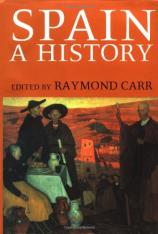Spain: A History
Review
Spain: A History
How
can one compile a 2000-year history of Spain into one slim 300 page
book? Ask Editor Raymond Carr. He just did it --- and it's filled
with beautiful illustrations. What's more, he's created a seamless
history of a fractured country, using eight other contributors:
Sebastian Balfour, Roger Collins, A. T. Fear, Felipe
Fernández-Armesto, Richard Fletcher, Richard Herr, Henry
Kamen, and Angus MacKay. Add all this together and you have a
palatable, informative, richly detailed yet not overbearing history
of one of the great countries of the world.
Just recently, my beautiful wife and I traveled to Spain. If only
we had Carr's SPAIN: A History to illuminate our experiences.
Certainly there is beauty --- we were constantly struck by things
fantastic and wondrous. The view of the Mediterranean from
Montjuïc in Barcelona, the spires of the Sagrada Família,
the Velásquez canvases in The Prado, the train rides through
desolate countryside, the cathedrals all spoke to us in so many
ways. But what struck us even more than the beauty was the history.
Around every corner there stood a building older than anything
standing in America. In Barcelona we stood before the sarcophagus
of a saint buried 1,000 years ago. History is what makes a place
come alive. Carr's book makes Spain come alive.
We start at the beginning, thanks to A. T. Fear: "Human history
began early in the peninsula. The bones of one of man's earliest
ancestors, Homo antecessor, who lived 800,000 years ago, have been
unearthed near Burgos, and Neanderthal Man (c. 60,000 BC) might
have been more just christened Gibraltar Woman, as the Rock was the
site of the first Neanderthal finds."
We find ourselves in the midst of Visigothic Spain before the Early
Middle Ages when Muslim's ruled: "Early medieval Spain was
multicultural in the sense of being culturally diverse, a land
within which different cultures coexisted; but not in the sense of
experiencing cultural integration. Toleration for Christians and
Jews as "Peoples of the Book" is enjoyed by the Koran. But in
practice it was limited..."
Empires form. Ferdinand and Isabella rule, sending Columbus to
discover new worlds. Philip III expels virtually all descendants of
the Moors. Worlds are conquered --- Pizarro brings the Incan Empire
to its knees and Charles V conquers Africa. Empires begin to sink.
The Spanish Armada in 1588 is faced by the British --- it is their
worst military disaster. Spain continues to sink and grow, sink and
grow, with ebbs and flows throughout the years.
The Spanish Civil War plays prominently towards the closing of the
book: "On each side, the war was fought over different but
interrelated issues. Within the insurgent side a wide range of
political agendas coexisted, from the defense of the traditional
order to fascist 'modernity.'" It concludes discussing where Spain
is today and where it may be headed in the near-distant
future.
Perhaps SPAIN: A History will be used in colleges across the
country as a textbook in various history classes. But don't be
fooled. It is not a textbook in the traditional sense, i.e.,
boring, stuffy, overladen with facts. It is an interesting book
telling a most interesting story. One can see that Spain is not
perfect, it has problems just as any other country does; but it has
a rich and glorious past, one filled with artistic, literary,
military and royal achievements. It has made its mark not only on
Europe but the world.
Carr, former Warden of St. Anthony's College at Oxford University,
knows Spain. He is the author of six books on Spanish history,
including MODERN SPAIN: 1875-1980 and THE SPANISH TRAGEDY: The
Civil War in Perspective. This knowledge is all too evident in his
contribution to the book as well as his choice of individuals to
write the various sections. They are all "academic" in the sense
that they are thoughtful, objective writings but at the same time
they are cogent and create understanding.
My wife and I want to go back to Spain. It touched us in a way that
really can't be described. Listening to an operatic street
performer in a Barcelona alleyway, trying to fathom a Salvador Dali
painting in Figueres, wandering through the halls of the National
Palace in Madrid, sipping horchata in the Plaza Mayor ---
these are memories that will never leave. When we do return, I know
I'll go with a richer understanding, thanks to Raymond Carr and his
book SPAIN: A History.
Reviewed by Jonathan Shipley on January 23, 2011
Spain: A History
- Publication Date: September 28, 2000
- Genres: History, Nonfiction
- Hardcover: 336 pages
- Publisher: Oxford University Press, USA
- ISBN-10: 0198206194
- ISBN-13: 9780198206194




